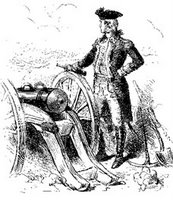Lt. Williams: “I am sorry to say I am Commanded by Mrs. Moodie”
According to records of the St. Andrew’s Society of New York (a social and mutual-aid organization for Scottish immigrants), Moodie had been a gunner in the Royal Artillery. He married Margaret Galloway, and they had children from 1768 to 1786.
On 1 Aug 1781, having already asked for a transfer several weeks before, Lt. Williams wrote to Col. John Lamb:
I am sorry to say I am Commanded by Mrs. Moodie & not him as whatever She says is Intirely a law with him. . . .A couple of things strike me about this situation. One is that the Continental artillery officers seem to have been particularly sensitive about questions of their rank and genteel status—perhaps because a lot of them were strivers rising from the working class.
the Other evening a Small debate happened between Capn. Moodie and me Concerning Cadets in hearing of her who [L]ays in next Marquee to me[;] we both parted friends and I went to my bed. [S]oon after He and Mrs. Moodie [had] High Words. . . .
Curiosity prompted me to listen to ye discourse which was this. that Capn. Moodie was not the Man he used to be or he would never take such discourse from me and advised him to make use of his pistols which he ought to have done Long before this. . . .
Since that he has been indeavouring in A Manner far below that of a Gentleman to Injure my Character.
The second observation is that Lt. Williams managed to “debate” with his superior officer loud enough to be heard in the next tent, eavesdrop on a conversation between that captain and his wife, and complain twice about the captain to the head of the regiment—and still feel himself to be the injured party.

